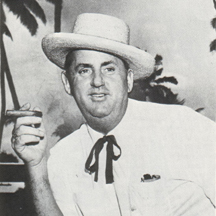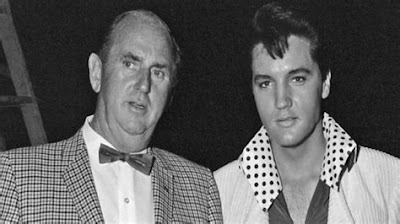Early Life and Background:
Colonel Parker's early life remains shrouded in mystery, and even basic details are subject to debate. Born to a Dutch family, he emigrated to the United States in the 1920s. It's believed that he joined the U.S. Army during World War II, earning the honorary title of colonel, which he retained throughout his life. The origin of the title and its legitimacy remain unclear, adding to the intrigue surrounding Parker's past.
The Beginnings of a Managerial Career:
Parker entered the entertainment industry in the 1940s, initially working with country and rockabilly artists. His reputation as a shrewd and effective manager began to take shape as he navigated the complexities of the music business. By the late 1940s, Parker had established himself as a seasoned manager with a keen understanding of the industry's dynamics.
Collaboration with Elvis Presley:
Colonel Parker's path intersected with Elvis Presley's in 1955, marking the beginning of one of the most iconic artist-manager relationships in music history. Presley, a young and dynamic performer, was rapidly gaining popularity, and Parker recognized the immense potential in the charismatic singer. In November 1955, Parker persuaded RCA Records to buy Presley's contract from Sun Records for an unprecedented sum of $35,000, an audacious move that set the stage for Presley's mainstream success.
The Management Style:
Parker's management style was characterized by an astute understanding of publicity, marketing, and promotion. He played a pivotal role in crafting Presley's image as a rebellious yet charming figure, capitalizing on the emerging rock 'n' roll culture. Parker's keen business sense and knack for publicity turned Presley into a global phenomenon, transcending the boundaries of music to become a cultural icon.
Controversial Decision-Making:
While Parker's managerial skills were undeniably effective, his decision-making was not without controversy. One of the most debated aspects of his management was the exclusive contract he negotiated with RCA, which gave Parker a 50% share of Presley's recording profits. This arrangement, while lucrative for Parker, raised questions about conflicts of interest and whether it prioritized the financial gains of the manager over the artist's welfare.
The Contractual Bind:
Parker's management of Presley was marked by an ironclad contract that significantly favoured the manager. Not only did Parker receive a substantial portion of Presley's earnings, but he also maintained control over key aspects of the artist's career, including film projects and endorsements. Critics argue that this arrangement limited Presley's creative freedom and hindered his ability to explore diverse artistic avenues.
Expansion into Films:
Under Parker's guidance, Presley ventured into acting, starring in a series of musical films that contributed significantly to his popularity. While these films were commercially successful, they often received mixed critical reviews. Parker's focus on profitable ventures sometimes clashed with artistic considerations, leading to a divergence in opinions about the artistic direction of Presley's career.
Personal Relations and the Elvis Entourage:
Parker's relationship with Presley extended beyond the professional realm, and the two developed a close personal bond. However, Parker's role in Presley's life was not without its complexities. As Presley's fame grew, so did the entourage surrounding him, with Parker positioned as a central figure. Some critics argue that Parker's influence contributed to the isolation of Presley from outside perspectives and may have played a role in the singer's later struggles.
Financial Challenges and Business Ventures:
Despite Presley's immense success, financial challenges plagued his career, partly due to Parker's contractual arrangements. The manager's focus on short-term gains sometimes hindered long-term financial planning. Parker's involvement in various business ventures, including the creation of Elvis Presley Enterprises, aimed to secure the artist's financial future. However, these efforts were not always successful, and financial difficulties persisted.
Later Years and Legacy:
Colonel Parker continued to manage Elvis Presley until the singer's death in 1977. Following Presley's passing, Parker faced criticism for his handling of the artist's estate. His control over Presley's posthumous legacy led to disputes with the Presley family and other stakeholders. Despite the controversies, Parker's impact on the music industry and entertainment business, particularly in the realm of artist management, remains undeniable.
The Legacy and Criticisms:
Colonel Tom Parker's legacy is a subject of ongoing debate. While he played an instrumental role in shaping Elvis Presley's career and elevating him to unparalleled heights, criticisms of Parker's management style, contractual decisions, and financial dealings persist. Some argue that Parker's prioritization of financial gain over artistic freedom ultimately hindered Presley's potential as an artist.
Conclusion:
Colonel Tom Parker's influence on the music industry and his role in shaping Elvis Presley's career are subjects of fascination and scrutiny. The enigmatic manager, with his mysterious background, strategic acumen, and controversial decision-making, remains a complex figure in the history of entertainment. As the music business continues to evolve, Parker's legacy serves as a case study in the delicate balance between artistic expression and commercial success, highlighting the enduring impact of a manager on an artist's trajectory.



No comments:
Post a Comment